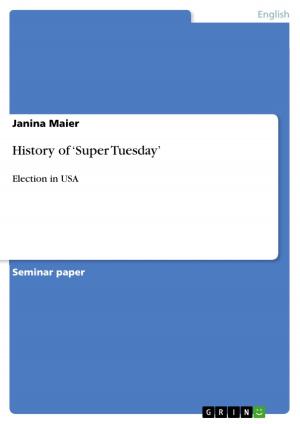If Caliban´s Wish Came True - The the master-servant relationship of Shakespeare's 'The Tempest' in Nadine Gordimer's contemporary novel
The the master-servant relationship of Shakespeare's 'The Tempest' in Nadine Gordimer's contemporary novel
Fiction & Literature, Literary Theory & Criticism, British| Author: | Bernd Evers | ISBN: | 9783638245821 |
| Publisher: | GRIN Publishing | Publication: | January 16, 2004 |
| Imprint: | GRIN Publishing | Language: | English |
| Author: | Bernd Evers |
| ISBN: | 9783638245821 |
| Publisher: | GRIN Publishing |
| Publication: | January 16, 2004 |
| Imprint: | GRIN Publishing |
| Language: | English |
Seminar paper from the year 2000 in the subject English Language and Literature Studies - Literature, grade: 2 (B), University of Potsdam (Institute for Anglistics), 13 entries in the bibliography, language: English, abstract: Already in 1611 William Shakespeare argued in his romance 'The Tempest' with the conquest of the New World. A wide space in this play is fulfilled by the analysis of the relationship between the European imperialist and the submissive native, shown by the example of Prospero, the rightful duke of Milan, and the creature Caliban, the 'savage and deformed slave'1. Nearly 400 years later, in 1982, the South African author Nadine Gordimer deals with the situation of the abused slave in her novel 'July's People' again. She creates a fictional situation where the former white-coloured masters have lost their power after a successful revolution of the suppressed black majority. The white middle-class-family the Smales become themselves sla ves as they are from now on dependent from their servant July, who offers them a refuge in his homeland. In the upcoming analysis I want to show that Nadine Gordimer created a situation which can be seen as 'If Caliban's wish came true...', as she continues the attempt of the slave to recover his liberty. I want to compare both novels in order to prove that Gordimer orientated herself very much on Shakespeare's play and makes use of typical characteristics of the master and the slave we find in 'there. Her work should be regarded on the one hand as continuation and on the other hand as a lean on 'The Tempest'. 1 Shakespeare, William. The Tempest. Ed. Rex Gibson. Cambridge: Cambridge UP,1995. 'List of Characters', 1.
Seminar paper from the year 2000 in the subject English Language and Literature Studies - Literature, grade: 2 (B), University of Potsdam (Institute for Anglistics), 13 entries in the bibliography, language: English, abstract: Already in 1611 William Shakespeare argued in his romance 'The Tempest' with the conquest of the New World. A wide space in this play is fulfilled by the analysis of the relationship between the European imperialist and the submissive native, shown by the example of Prospero, the rightful duke of Milan, and the creature Caliban, the 'savage and deformed slave'1. Nearly 400 years later, in 1982, the South African author Nadine Gordimer deals with the situation of the abused slave in her novel 'July's People' again. She creates a fictional situation where the former white-coloured masters have lost their power after a successful revolution of the suppressed black majority. The white middle-class-family the Smales become themselves sla ves as they are from now on dependent from their servant July, who offers them a refuge in his homeland. In the upcoming analysis I want to show that Nadine Gordimer created a situation which can be seen as 'If Caliban's wish came true...', as she continues the attempt of the slave to recover his liberty. I want to compare both novels in order to prove that Gordimer orientated herself very much on Shakespeare's play and makes use of typical characteristics of the master and the slave we find in 'there. Her work should be regarded on the one hand as continuation and on the other hand as a lean on 'The Tempest'. 1 Shakespeare, William. The Tempest. Ed. Rex Gibson. Cambridge: Cambridge UP,1995. 'List of Characters', 1.















